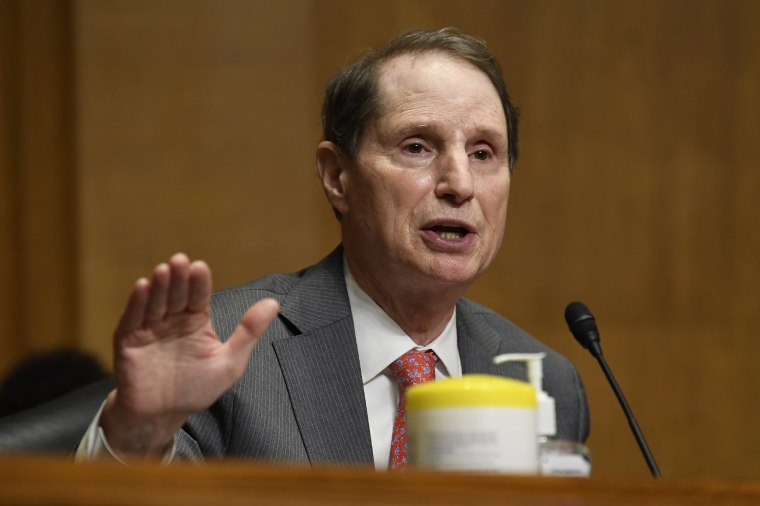WASHINGTON — Democrats on the Senate Finance Committee are circulating a menu of options to raise tax revenues to finance President Joe Biden's multi-trillion-dollar package.
The four-page document, obtained by NBC News, describes a broad range of potential policies — including new corporate and international taxes, higher taxes on top individual and investment incomes, changes to taxation of estates, new taxes on carbon and plastic, among others.
It comes after regular meetings held by Senate Finance Chair Ron Wyden, D-Ore., with members of the committee to gauge interest on ideas they might be willing to support.
A source familiar with the document said the document does not represent a final set of policies for the 50-member Democratic caucus, which needs unanimous agreement to pass them. Rather, it is a series of targets for discussion as senators grapple with how much revenue to raise to finance a bill that could include up to $3.5 trillion in spending on health care, education, child care and more.
Some of the proposals have been introduced by Wyden as standalone bills, while others have been floated by Biden and other Democrats.
The source said some of the ideas have broader support within the caucus, like the pursuit of new corporate and international revenues, while other provisions have faced internal resistance, such as taxing capital gains as ordinary income.
The Democrats are weighing some creative options to find new revenue. For instance, one idea would slap an excise tax on corporations that pay CEOs a certain ratio more than the average worker. They're also considering as much as $80 billion in new IRS funding, aimed at beefing up enforcement in a way that yields more revenue than the expenses.
The committee is also considering new fees on carbon and fossil fuels as part of a movement toward clean energy. It is looking at a proposal that would enforce the first-ever border tax on products from foreign countries who haven’t curbed their emissions, aimed at helping shore up U.S. innovation.
The proposed revenue provisions could repeal most tax subsidies for the fossil fuel industry, a move Democrats argue would bolster U.S. energy independence and decrease fossil fuel pollution.
Senate Majority Leader Chuck Schumer projected last month that Democrats’ multi-trillion dollar package would cut U.S. emissions by 45 percent by 2030.
But the proposed carbon tax could be a controversial issue in Congress, even among Democrats.
Senator Joe Manchin, D-W.Va., who raised concerns about inflation and urged Democrats to hit "pause" on the package, represents one of the largest coal-mining communities in the nation.
Manchin — and every Democratic senator — will need to be on board for them to pass the package in the chamber. It also needs to clear a narrow House majority before it can become law.


